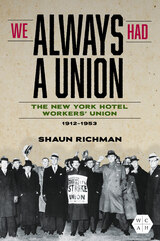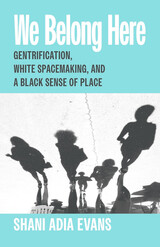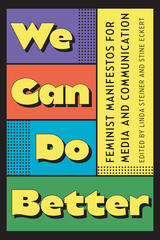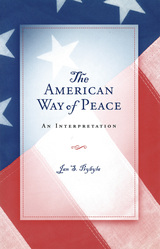
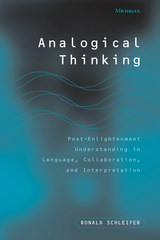
The book traces this mode of thinking in linguistics, collaborative intellectual work in the arts and sciences, and interpretations of literary and sacred texts, concluding with a reading of the concept of Enlightenment in a comparison of Descartes and Foucault. The book examines the poststructuralism of Derrida; the collaborations of information theory and modern science as opposed to the individualism of Adam Smith and others, and analogical interpretations of Yeats, Dinesen, the Bible, Dreiser, and Mailer. Its overall aim is to present an interdisciplinary examination of a particular kind of understanding that responds to the experiences of our time.
Ronald Schleifer is Professor of English, University of Oklahoma. His books include Rhetoric and Death: The Language of Modernism and Postmodern Discourse Theory, Criticism and Culture; and Culture and Cognition: The Boundaries of Literary and Scientific Inquiry.
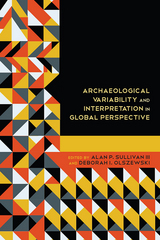
The chapters explore how the analysis of artifact, assemblage, and site distributions at different spatial and temporal scales provides new insights into how mobility strategies affect lithic assemblage composition, what causes unstable interaction patterns in complex societies, and which factors promote a sense of “place” in landscapes of abandoned structures. In addition, several chapters illustrate how new theoretical approaches and innovative methods promote reinterpretations of the regional significance of historically important archaeological sites such as Myrtos-Pyrgos (Crete, Greece), Aztalan (Wisconsin, USA), Tabun Cave (Israel), and Casas Grandes (Chihuahua, Mexico).
The studies presented in Archaeological Variability and Interpretation in Global Perspective challenge orthodoxy, raise research-worthy controversies, and develop strong inferences about the diverse evolutionary pathways of humankind using theoretical perspectives that consider both new information and preexisting archaeological data.
Contributors: C. Michael Barton, Brian F. Byrd, Gerald Cadogan, Philip G. Chase, Harold L. Dibble, Matthew J. Douglass, Patricia C. Fanning, Lynne Goldstein, Simon J. Holdaway, Kathryn A. Kamp, Sam Lin, Emilia Oddo, Zeljko Rezek, Julien Riel-Salvatore, Gary O. Rollefson, Jeffrey Rosenthal, Barbara J. Roth, Sissel Schroeder, Justin I. Shiner, John C. Whittaker, David R. Wilcox
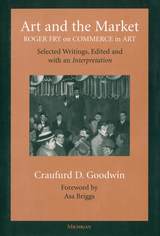
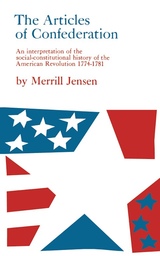
"An admirable analysis. It presents, in succinct form, the results of a generation of study of this chapter of our history and summarizes fairly the conclusions of that study."—Henry Steele Commager, New York Times Book Review

The second volume in the Studies in Interpretation series delves further into the intricacies of sign language interpreting in five distinctive chapters. In the first chapter, Lawrence Forestal investigates the shifting attitudes of Deaf leaders toward sign language interpreters. Forestal notes how older leaders think of interpreters as their friends in exchanges, whereas Deaf individuals who attended mainstream schools possessed different feelings about interpreting.
Frank J. Harrington observes in his chapter on British Sign Language-English interpreters in higher education that they cannot be viewed in isolation since all participants and the environment have a real impact on the way events unfold. In Chapter Three, Maree Madden explores the prevalence of chronic occupational physical injury among Australian Sign Language interpreters due to the stress created by constant demand and the lack of recognition of their professional rights.
Susan M. Mather assesses and identifies regulators used by teachers and interpreters in mainstreaming classrooms. Her study supports other findings, including the success of ethnographic methods in providing insights into human interaction and intercultural communication within classroom settings. The fifth chapter views how interpreters convey innuendo, a complicated undertaking at best. Author Shaun Tray conducts a thorough examination of innuendo in American Sign Language, then points the way toward future research based upon ethnography, gender, and other key factors.
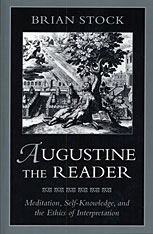
Augustine of Hippo, a central figure in the history of Western thought, is also the author of a theory of reading that has had a profound influence on Western letters from the ages of Petrarch, Montaigne, Luther, and Rousseau to those of Freud and our own time. Brian Stock provides the first full account of this theory within the evolution of Augustine’s early dialogues, his Confessions, and his systematic treatises.
Augustine was convinced that words and images play a mediating role in our perceptions of reality. In the union of philosophy, psychology, and literary insights that forms the basis of his theory of reading, the reader emerges as the dominant model of the reflective self. Meditative reading, indeed the meditative act that constitutes reading itself, becomes the portal to inner being. At the same time, Augustine argues that the self-knowledge reading brings is, of necessity, limited, since it is faith rather than interpretive reason that can translate reading into forms of understanding.
In making his theory of reading a central concern, Augustine rethinks ancient doctrines about images, memory, emotion, and cognition. In judging what readers gain and do not gain from the sensory and mental understanding of texts, he takes up questions that have reappeared in contemporary thinking. He prefigures, and in a way he teaches us to recognize, our own preoccupations with the phenomenology of reading, the hermeneutics of tradition, and the ethics of interpretation.

Launched in 1995, Bach Perspectives has become the premier English-language serial book series dedicated to cutting-edge Bach scholarship. The University of Illinois Press now offers the first four volumes in open access editions available for free to all interested readers.
The fourth volume of Bach Perspectives analyzes J. S. Bach’s orchestral works, especially his concertos, and the interpretation and performance of his music in general. The diverse contributors come from the fields of performance, organology, music theory, and music history, and their expertise across multiple areas provides an interdisciplinary perspective to their chapters.
Contributors: Gregory G. Butler, John Butt, John Koster, Alfred Mann, Mary Oleskiewicz, William Renwick, David Schulenberg, Jeanne Swack, and Paul Walker
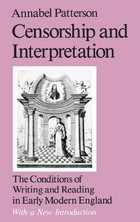
Annabel Patterson explores the effects of censorship on both writing and reading in early modern England, drawing analogies and connections with France during the same period.
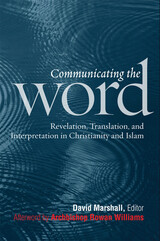
Communicating the Word is a record of the 2008 Building Bridges seminar, an annual dialogue between leading Christian and Muslim scholars convened by the Archbishop of Canterbury. Featuring the insights of internationally known Christian and Muslim scholars, the essays collected here focus attention on key scriptural texts but also engage with both classical and contemporary Islamic and Christian thought. Issues addressed include, among others, the different ways in which Christians and Muslims think of their scriptures as the “Word of God,” the possibilities and challenges of translating scripture, and the methods—and conflicts—involved in interpreting scripture in the past and today.
In his concluding reflections, Archbishop Rowan Williams draws attention to a fundamental point emerging from these fascinating contributions: “Islam and Christianity alike give a high valuation to the conviction that God speaks to us. Grasping what that does and does not mean . . . is challenging theological work.”
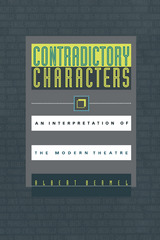
Playwright and critic Albert Bermel examines thirteen modern plays to assess the underpinnings of dramatic conflict. Contradictory Characters inspects the three well-known types of dramatic conflict-between characters, between character and environment, and within the protagonist himself-and argues that the "character-against-himself" is not only a type of conflict, but is indeed the prototypical conflict underlying the others.
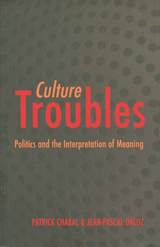
Culture Troubles is a systematic reevaluation of the role of culture in political analysis. Here, Patrick Chabal and Jean-Pascal Daloz contend that it is unwise to compare different societies without taking into account culture, which in their interpretation is not a system of values, but rather a system of inherited meanings and symbols. This cultural approach, they argue, can attribute meaning to political comparison, and they outline the shape of that approach, one that draws from an eclectic range of sources. Illustrating the sharpness and acuity of their methods, they proceed with a comparative study of the state and political representation in three very different nations—France, Nigeria, and Sweden—to untangle the many ways that culture informs our understanding of political events. As a result, Culture Troubles offers a rational starting point from which we may begin to understand foreign politics.
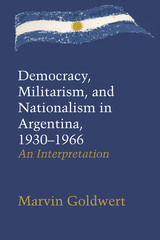
Until 1930, Argentina was one of the great hopes for stable democracy in Latin America. Argentines themselves believed in the destiny of their nation to become the leading Latin American country in wealth, power, and culture. But the revolution of 1930 unleashed the scourges of modern militarism and chronic instability in the land. Between 1930 and 1966, the Argentine armed forces, or factions of the armed forces, overthrew the government five times.
For several decades, militarism was the central problem in Argentine political life. In this study, Marvin Goldwert interprets the rise, growth, and development of militarism in Argentina from 1930 to 1966. The tortuous course of Argentine militarism is explained through an integrating hypothesis. The army is viewed as a “power factor,” torn by a permanent dichotomy of values, which rendered it incapable of bringing modernization to Argentina. Caught between conflicting drives for social order and modernization, the army was an ambivalent force for change. First frustrated by incompetent politicians (1916–1943), the army was later driven by Colonel Juan D. Perón into an uneasy alliance with labor (1943–1955). Peronism initially represented the means by which army officers could have their cake—nationalistic modernization—and still eat it in peace, with the masses organized in captive unions tied to an authoritarian state.
After 1955, when Perón was overthrown, a deeply divided army struggled to contain the remnants of its own dictatorial creation. In 1966, the army, dedicated to staunch anti-Peronism, again seized the state and revived the dream of reconciling social order and modernization through military rule.
Although militarism has been a central problem in Argentine political life, it is also the fever that suggests deeper maladies in the body politic. Marvin Goldwert seeks to relate developments in the military to the larger political, social, and economic developments in Argentine history. The army and its factions are viewed as integral parts of the whole political spectrum during the period under study.
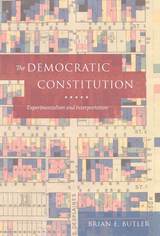
Butler offers an alternative democratic conception of constitutional law, “democratic experimentalism,” and applies it in a thorough reconstruction of Supreme Court cases across the centuries, such as Brown v. Board of Education, Citizens United v. Federal Election Commission, Lucas v. South Carolina Coastal Council, and Lochner v. New York. In contrast to the traditional tools and conceptions of legal analysis that see the law as a formally unique and separate type of practice, democratic experimentalism combines democratic aims and experimental practice. Butler also suggests other directions jurisprudential roles could take: for example, adjudication could be performed by primary stakeholders with better information. Ultimately, Butler argues persuasively for a move away from the current absolute centrality of courts toward a system of justice that emphasizes local rule and democratic choice.

Descriptions of dreams abound in the literatures of the Near East and North Africa. The Prophet Muhammad endowed them with a theological dimension, saying that after him “true dreams” would be the only channel for prophecy. Dreams were often used to support conflicting theological and political arguments, and the local chronicles contain many accounts of royal dreams justifying the advent of new dynasties.
This volume explores the context of these theological speculations and political aspirations through the medium of dreams to present fascinating insights into the social history of the pre-modern Islamic world in all its cultural diversity. Wider cultural exchanges are discussed through concrete examples such as the Arabic version of the Aristotelian treatise De divinatione per somnum. Some of the current scholarly assumptions about dreams being merely stylized expressions of social conventions are challenged by personal reports that express individual personalities, self-awareness, and spiritual development.
This is the first volume of the Ilex Series on Themes and Traditions. The series explores cross-cultural constructs without losing sight of the rich texture of local variations of traditions or beliefs.
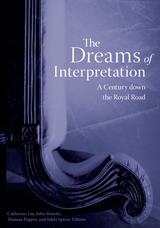
Rethinking the importance of Sigmund Freud’s landmark book The Interpretation of Dreams a century after its publication in 1900, this work brings together psychoanalysts, philosophers, cultural theorists, film and visual theorists, and literary critics from several continents in a compilation of the best clinical and theoretical work being done in psychoanalysis today. It is unique in convening both theory and practice in productive dialogue, reflecting on the encounter between psychoanalysis and the tradition of hermeneutics. Collectively the essays argue that Freud’s legacy has shaped the way we think about not only psychology and the nature of the self but also our understanding of politics, culture, and even thought itself.
Contributors: Willy Apollon, Gifric; Karyn Ball, U of Alberta, Edmonton; Raymond Bellour, Centre National de la Recherche Scientifique; Patricia Gherovici, Philadelphia Lacan Study Group and Seminar; Judith Feher-Gurewich, New York U; Jonathan Kahana, New York U; A. Kiarina Kordela, Macalester College; Pablo Kovalovsky, Clinica de Borde; Jean Laplanche, U of Lausanne; Laura Marcus, U of Sussex; Andrew McNamara, Queensland U of Technology; Claire Nahon; Yun Peng, U of Minnesota; Gerard Pommier, Nantes U; Jean-Michel Rabaté, Princeton U; Laurence A. Rickels, U of California, Santa Barbara; Avital Ronell, New York U; Elke Siegel, Yale U; Rei Terada, U of California, Irvine; Klaus Theweleit, U of Freiburg-im-Breisgau; Paul Verhaege, U of Ghent, Belgium; Silke-Maria Weineck, U of Michigan.
Catherine Liu is associate professor of comparative literature and film and media studies at the University of California, Irvine. John Mowitt is professor and chair of cultural studies and comparative literature at the University of Minnesota. Thomas Pepper is associate professor of cultural studies and comparative literature at the University of Minnesota. Jakki Spicer received her Ph.D. in cultural studies and comparative literature from the University of Minnesota.

The best resource for interpreting these widely used personality assessment tests.
The best resource for interpreting these widely used personality assessment tests.
Essentials of MMPI-2 and MMPI-A Interpretation presents innovative interpretive strategies for both the Minnesota Multiphasic Personality Inventory-2, or MMPI-2, and the adaptation for adolescents, the MMPI-A. James N. Butcher and Carolyn L. Williams detail the rationale for the revision and development of the instruments and their scales, and describe how to administer, score, profile, code, and interpret the tests.The revised edition includes the most recent MMPI research, including new information on ethnic background and cultural setting as they relate to assessment. Focusing primarily on studies of profile validity and external correlates, the revision also includes interpretive guidelines for several scales that will be introduced into the MMPI tests in 2000.Translation inquiries: University of Minnesota Press
Finland in the Twentieth Century was first published in 1980. Minnesota Archive Editions uses digital technology to make long-unavailable books once again accessible, and are published unaltered from the original University of Minnesota Press editions.
Finland's search for a national identity is the underlying theme of this book. A small nation, geographically isolated and linguistically distinct from its neighbors, Finland has long maintained close ties with Sweden and also has had to come to terms with a powerful eastern neighbor, the Soviet Union. D.G. Kirby opens his history with a description of Finland at the turn of the century, when it was a Grand Duchy in the Russian Empire, and traces its emergence as an independent state with the collapse of the Empire in 1917. He examines the new republic's struggle for survival—and identity—after the civil war of 1918, which left a legacy of political instability through the interwar years.
Finland's complex political history is closely tied to its external relations. Kirby describes the evolution of Finnish foreign policy from the period when Finland and the Soviet Union were distrustful and then warring neighbors down to the present policy of friendship and cooperation which grew out of the treaty of 1948. The book closes with an account of Finland's international and domestic status in the Kekkonen era.
Throughout, Kirby provides a substantial socio-economic background to round out his political and diplomatic themes. He also brings to the English-language readers the results of modern Finish historical research. Since historians have played a key role in Finland as interpreters of the nation's recent past, his analysis of their debates helps clarify the ways in which Finland has developed as an independent state in the twentieth century.
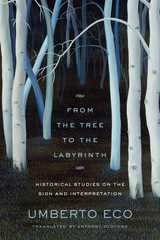
The way we create and organize knowledge is the theme of From the Tree to the Labyrinth, a major achievement by one of the world’s foremost thinkers on language and interpretation. Umberto Eco begins by arguing that our familiar system of classification by genus and species derives from the Neo-Platonist idea of a “tree of knowledge.” He then moves to the idea of the dictionary, which—like a tree whose trunk anchors a great hierarchy of branching categories—orders knowledge into a matrix of definitions. In Eco’s view, though, the dictionary is too rigid: it turns knowledge into a closed system. A more flexible organizational scheme is the encyclopedia, which—instead of resembling a tree with finite branches—offers a labyrinth of never-ending pathways. Presenting knowledge as a network of interlinked relationships, the encyclopedia sacrifices humankind’s dream of possessing absolute knowledge, but in compensation we gain the freedom to pursue an infinity of new connections and meanings.
Moving effortlessly from analyses of Aristotle and James Joyce to the philosophical difficulties of telling dogs from cats, Eco demonstrates time and again his inimitable ability to bridge ancient, medieval, and modern modes of thought. From the Tree to the Labyrinth is a brilliant illustration of Eco’s longstanding argument that problems of interpretation can be solved only in historical context.
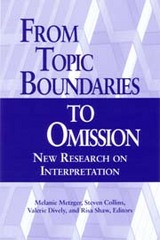
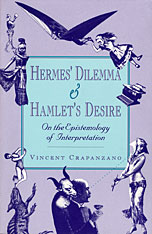
A distinguished anthropologist and a creative force behind postmodern writing in his field, Vincent Crapanzano here focuses his considerable critical powers upon his own culture. In essays that question how the human sciences, particularly anthropology and psychoanalysis, articulate their fields of study, Crapanzano addresses nothing less than the enormous problem of defining the self in both its individual and collective projections.
Treating subjects as diverse as Roman carnivals and Balinese cockfights, circumcision, dreaming, and spirit possession in Morocco, transference in psychoanalysis, self-characterization in teenage girls’ gossip, Alice in Wonderland, and Jane Austen’s Emma, dialogue models in hermeneutics, and semantic vertigo in Hamlet’s Elsinore, these essays look critically at the inner workings of interpretation in human sciences and literary study. In modern Western culture’s attempts to interpret and communicate the nature of other cultures, Crapanzano finds a crippling crisis in representation. He shows how the quest for knowledge of “exotic” and “primitive” people is often confused with an unexamined need for self-definition, and he sets forth the resulting interpretive paradoxes, particularly the suppression of any awareness of the play of power and desire in such an approach. What is missing from contemporary theories of interpretation is, in Crapanzano’s account, a crucial understanding of the role context plays in any act of communication or its representation—in interpretation itself.
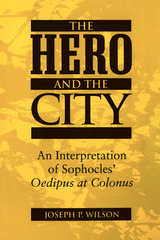
Joseph P. Wilson is Professor of Foreign Languages at the University of Scranton.

Heroic Knowledge was first published in 1957. Minnesota Archive Editions uses digital technology to make long-unavailable books once again accessible, and are published unaltered from the original University of Minnesota Press editions.
Professor Stein's critical work on Milton which was launched in his earlier book, Answerable Style: Essays on Paradise Lost, is completed in this volume. He devotes eight essays to Paradise Regained and five to Samson Agonistes. In addition, a preface explains his assumptions and a postscript connects and extends the implications of his work. The author's purpose and method are, perhaps, best described in his own words: "For the most part I have tried to demonstrate rather than to argue, and have (except in some notes) avoided engaging the established critical problems separately; but have instead trusted that a fresh critical interpretation of the poems would come to terms with the major problems while in motion, as part of a developing grasp of the integrated working of the poems."

In the wake of this collapse or "fall," the rival claims of fiction, psychoanalysis, sociology, anthropology, and history have created the dilemma of radical relativism, the prospect of multiple interpretations of any complex historical event. The basic strategy of social theory and the social sciences—the search for underlying unities—proves so inherently contradictory and has provided so little in the way of reliable knowledge of social and historical relationships that to many critics it seems no longer worth pursuing.
Weinstein enters the debate by rejecting any search for underlying structural unities, dynamic or social, through which historians have attempted to find continuity with the past. He looks instead to ideological processes, to the construction of successive and changing versions of reality that mediate between the power of fantasy on the one side and the power of the social world on the other. He argues further that the need to use ideological constructs in this way accounts for the heterogeneous and changing content of social movements and for the persistent need people have always had for authoritative leaders, even in democratized societies. He suggests that people have historically been able to take a step away from leaders only by substituting the possession of objects such as property or money. This book is a breakthrough in poststructuralist theory that is sure to stimulate considerable discussion, especially about the shape of the social sciences and the future of historical interpretation.

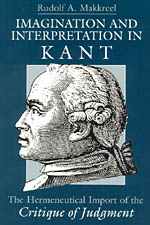
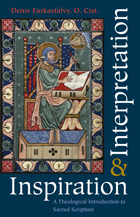
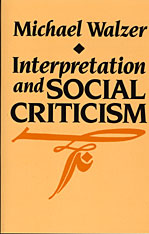
What do social critics do? I How do they go about doing it? Where do their principles come from? How do critics establish their distance from the people and institutions they criticize?
Michael Walzer addresses these problems in succinct and engaging fashion, providing a philosophical framework for understanding social criticism as a social practice. Walzer maintains that social criticism is an ordinary activity—less the offspring of scientific knowledge than the “educated cousin of common complaint”—and does not depend for its force or accuracy upon any sort of high theory. In his view, the social critic is not someone radically detached and disinterested, who looks at society as a total stranger and applies objective and universal principles. The true social critic must stand only a little to the side of his society—unlike Jean-Paul Sartre during the Algerian war, for example, who described himself as an enemy of his own people. And unlike Lenin, who judged Russian society against a standard worked out with reference to other places far away.
The “connected” critic is the model Walzer offers, one whose distance is measured in inches but who is highly critical nevertheless. John Locke is one example of the connected critic who argued for religious toleration not as a universal right ordained by reason but as a practical consequence of Protestant theology. The biblical prophets, such as Amos, were also men of their own day, with a particular quarrel to conduct with their fellows; the universalism of that quarrel is our own extrapolation. Walzer explains where critical principles come from, how much distance is “critical distance,” and what the historical practice of criticism has actually been like in the work of social philosophers such as Marx, Gramsci, Koestler, Lenin, Habermas, and Rawls.
Walzer posits a moral world already in existence, a historical product, that gives structure to our lives but whose ordinances are always uncertain and in need of scrutiny, argument, and commentary. The social critic need bring to his task only the ordinary tools of interpretation. Philosophers, political theorists, and all readers seriously interested in the possibility of a moral life will find sustenance and inspiration in this book.
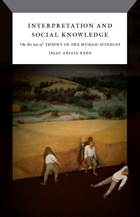

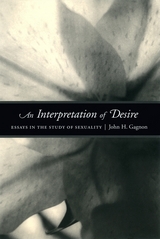
Gagnon may be best known as the coauthor of Sexual Conduct—a book that introduced the seminal concept of sexual scripting—and as one of the coauthors of The Social Organization of Sexuality, a foundational work that is widely considered to be the most important study of human sexual behavior since the Kinsey report. The essays collected here first trace the influence of scripting theory on Gagnon, outlining the radical departure he took from the dominant biological and psychiatric models of sex research. The volume then turns to more recent essays that consider such vexed issues as homosexuality, the theories of Sigmund Freud, HIV, hazardous sex, and the social aspects of sexually transmitted diseases.
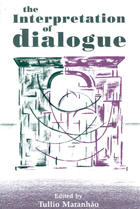



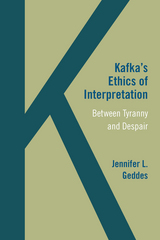
Geddes explores the interpretation that takes place within, and in response to, Kafka's writings, and pairs Kafka's works with readings of Sigmund Freud, Pierre Bourdieu, Tzvetan Todorov, Emmanuel Levinas, and others. She argues that Kafka explores interpretation as a mode of power and violence, but also as a mode of engagement with the world and others. Kafka, she argues, challenges us to rethink the ways we read texts, engage others, and navigate the world through our interpretations of them.
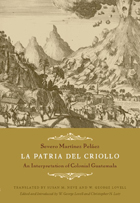
Martínez Peláez asserts that “the coffee dictatorships were the full and radical realization of criollo notions of the patria.” This patria, or homeland, was one that criollos had wrested from Spaniards in the name of independence and taken control of based on claims of liberal reform. He contends that since labor is needed to make land productive, the exploitation of labor, particularly Indian labor, was a necessary complement to criollo appropriation. His depiction of colonial reality is bleak, and his portrayal of Spanish and criollo behavior toward Indians unrelenting in its emphasis on cruelty and oppression. Martínez Peláez felt that the grim past he documented surfaces each day in an equally grim present, and that confronting the past is a necessary step in any effort to improve Guatemala’s woes. An extensive introduction situates La Patria del Criollo in historical context and relates it to contemporary issues and debates.
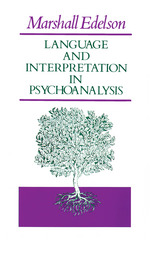
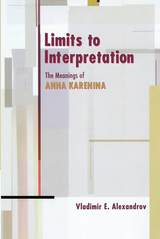
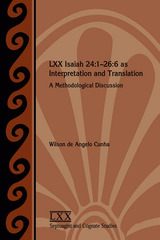
Explore how interpretation affects translation
In this volume Cunha argues that the differences found between the Septuagint text of Isaiah and the Hebrew of the Masoretic Text must be weighed against the literary context in which they are found. The author demonstrates that LXX Isa 24:1–26:6 can be seen as a coherent ideological composition that differs greatly from the way scholars have interpreted MT Isa 24:1–26:6. This coherence comes across through the use of certain lexemes and conjunctions throughout the passage. The book lays the case that a scribe or translator already had an interpretation before he started the process of translation that shaped his translation of the Hebrew text into Greek.
Features:
- An introduction sketching the history of research on LXX Isa 24:1–26:6
- A focused comparision of the Masoretic Text to the Septuagint
- A thorough discussion of the coherence of LXX Isa 24:1–26:6
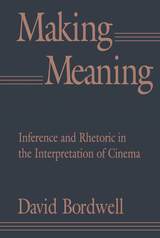
David Bordwell’s new book is at once a history of film criticism, an analysis of how critics interpret film, and a proposal for an alternative program for film studies. It is an anatomy of film criticism meant to reset the agenda for film scholarship. As such Making Meaning should be a landmark book, a focus for debate from which future film study will evolve.
Bordwell systematically maps different strategies for interpreting films and making meaning, illustrating his points with a vast array of examples from Western film criticism. Following an introductory chapter that sets out the terms and scope of the argument, Bordwell goes on to show how critical institutions constrain and contain the very practices they promote, and how the interpretation of texts has become a central preoccupation of the humanities. He gives lucid accounts of the development of film criticism in France, Britain, and the United States since World War II; analyzes this development through two important types of criticism, thematic-explicatory and symptomatic; and shows that both types, usually seen as antithetical, in fact have much in common. These diverse and even warring schools of criticism share conventional, rhetorical, and problem-solving techniques—a point that has broad-ranging implications for the way critics practice their art. The book concludes with a survey of the alternatives to criticism based on interpretation and, finally, with the proposal that a historical poetics of cinema offers the most fruitful framework for film analysis.
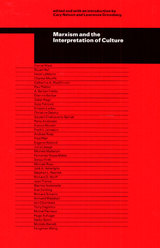

Readers of Herodotus’s Histories are familiar with its reports of bizarre portents, riddling oracles, and striking dreams. But Herodotus draws our attention to other types of signs too, beginning with human speech itself as a coded system that can manipulate and be manipulated. Objects, gifts, artifacts, markings, even the human body, are all capable of being invested with meaning in the Histories and Herodotus shows that conventionally and culturally determined actions, gestures, and ritual all need decoding.
This book represents an unprecedented examination of signs and their interpreters, as well as the terminology Herodotus uses to describe sign transmission, reception, and decoding. Through his control and involvement in this process he emerges as a veritable “master of signs.”

This is the key volume in the New York Metropolitan Region Study. It is a synthesis and interpretation of the seven specialized books that have already been published and the one that is still awaiting publication. Here, at last, with a depth of perspective made possible by the author's familiarity with the unpublished as well as the published findings of the other participants in the Study, is the whole picture--New York's busy and varied economy as it is now, as it has been, and as it is likely to be twenty-five years from now.
Beginning with the visible present, Mr. Vernon with swift strokes lays bare the essentials of the economic history of the New York Region. He shows how its industries grew out of one another, the part played by labor, the early crucial role of the port, and the later crucial role of "clustering" that enables firms to share common facilities. He discusses the Region's advantages and disadvantages for different kinds of business and industry, the interrelation between the jobs in the Region and the people who live in it. He traces the movement of jobs geographically in and out of the Region as a whole, and also outward within the Region, relating this outward movement to such developments as the thinning-out of population in mid-city tenements and the continuing boom in suburban split-levels. He analyzes the problems besetting the multitude of local governments in the Region, and the crisis of commuting and rapid transit services. Finally he projects the metropolis of 1985, picturing it as all the infinitely complex forces of its history to date indicate that it will be, if these forces are not altered in their future operation by governmental actions of unprecedented magnitude.
In this book there is clearly presented the information that can enable the metropolitan dwellers themselves to communicate more effectively with the experts whose business is objective evaluation of urban problems. Once that communication is established, Mr. Vernon says, "We shall have moved a giant step closer to the objective of a more tolerable metropolitan environment."
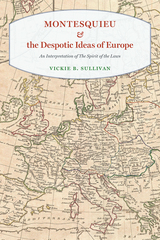
Nowhere is Montesquieu’s critique of the despotic ideas of Europe more powerful than in his enormously influential The Spirit of the Laws, and Vickie B. Sullivan guides readers through Montesquieu’s sometimes veiled, yet sharply critical accounts of Machiavelli, Hobbes, Aristotle, and Plato, as well as various Christian thinkers. He finds deleterious consequences, for example, in brutal Machiavellianism, in Hobbes’s justifications for the rule of one, in Plato’s reasoning that denied slaves the right of natural defense, and in the Christian teachings that equated heresy with treason and informed the Inquisition.
In this new reading of Montesquieu’s masterwork, Sullivan corrects the misconception that it offers simple, objective observations, showing it instead to be a powerful critique of European politics that would become remarkably and regrettably prescient after Montesquieu’s death when despotism wound its way through Europe.
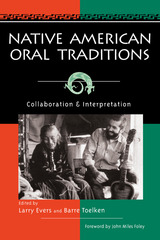
This collection provides a benchmark that helps secure the position of collaboration between Native American and non-Native American scholars in the forefront of study of Native oral traditions. Seven sets of intercultural authors present Native American oral texts with commentary, exploring dimensions of perspective, discovery, and meaning that emerge through collaborative translation and interpretation. The texts studied all come from the American West but include a rich variety of material, since their tribal sources range from the Yupik in the Arctic to the Yaqui in the Sonoran Desert.
This presentation of jointly authored work is timely: it addresses increasing interest in, calls for, and movement toward reflexivity in the relationships between scholars and the Native communities they study, and it responds to the renewed commitment in those communities to asserting more control over representations of their traditions. Although Native and academic communities have long tried to work together in the study of culture and literature, the relationship has been awkward and imbalanced toward the academics. In many cases, the contributions of Native assistants, informants, translators, and field workers to the work of professional ethnographers has been inadequately credited, ignored, or only recently uncovered. Native Americans usually have not participated in planning and writing such projects. Native American Oral Traditions provides models for overcoming such obstacles to interpreting and understanding Native oral literature in relation to the communities and cultures from which it comes.
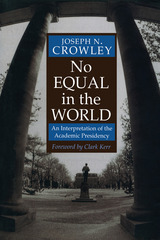

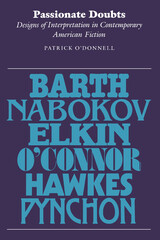
In an introductory dialogue and a closing chapter on the reader in contemporary fiction, O'Donnell shows that the formation of the reader's self, like character, plot, or any other element in fiction, is also part of the experience of the text, requiring a distinctive conception of interpretation. Calling upon a wide assemblage of modern theorists including Foucault, Derrida, Serres, Binswanger, Geertz, and Gadamer, O'Donnell elicits a broad range of interpretive possibilities—philosophical, psychological, archaeological, and linguistic—which speak to each novel's central concern with the act of reading as a form of signification.
While Passionate Doubts is broadly a hermeneutic study of contemporary fiction, the heart of this intriguing work resides in the close scrutiny of six modern novels which so richly evoke the very elements from which theories derive: language, form, and impulse. It is this specific application of theory that sets Passionate Doubts apart from other works in the field, yielding a series of important insights on the subject of language, sign, and the self in modern literature.

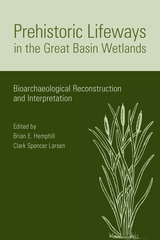
Prehistoric Lifeways of the Great Basin Wetlands examines how the earliest inhabitants of the Great basin in Nevada, Utah, and Oregon made use of ancient marshes and lakes.
When the Great Salt Lake receded in the 1980s from its highest historically recorded levels, it exposed a large number of archaeological and burial sites. Other wetland areas in the region experienced similar flooding and site exposure. The resulting archaeological bonanza resolved long-standing controversy over the role of wetlands in prehistoric Great Basin human subsistence. Previously, archaeologists argued two disparate views: either wetlands offered a wealth of resources and served as a magnet for human occupation and rather sedentary lifestyles, or wetlands provided only meager fare that was insufficient to promote increased sedentism. The exposure of human remains coincided with improved analytic techniques, enabling new conclusions about diet, behavior, and genetic affiliation.
This volume presents findings from three Great Basin wetland areas: Great Salt Lake, Stillwater Marsh (Nevada) and Malheur Lake (Oregon). The evidence presented here does not indicate the superiority of one interpretation over another but offers a more complex picture of variable adaptation, high mobility, and generally robust health among peoples living in a harsh setting with heavy physical demands. It is the first volume to draw together new approaches to the study of earlier human societies, including analysis of mtDNA for population reconstruction and cross-sectional geometric assessment of long bones for behavior interpretation.

This is a major phenomenological work in which real learning works in graceful tandem with genuine and important insight. Yet this is not a work of scholarship; it is a work of philosophy, a work that succeeds both in the careful, descriptive massing of detail and in the power of its analysis of the conditions that underlie the possibility of such things as description, interpretation, perception, and meaning.
Principles of Interpretation formulates answers to these questions: How does the interpretative process proceed? What are its fundamentals? What assurance have we that our interpretations are in principal faithful to that which is to be interpreted? What conclusions are indicated concerning the past phases of our history and its present tendencies?
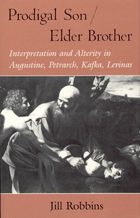
"Through a creative reading of the prodigal son parable, Jill Robbins demonstrates the hermeneutical impasse of the Christian exegete who must and yet cannot incorporate the Old Testament. Having disclosed the aporia at the heart of Christian hermeneutics, she proposes an alternative approach to the Hebrew Bible and new interpretations of Augustine, Petrarch, Kafka, and Levinas. Robbins brilliantly integrates the discourses of biblical texts, literary works, and critical analysis."—Mark C. Taylor, Williams College
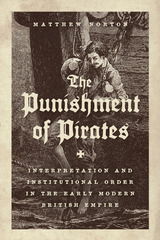
Early in the seventeenth-century boom of seafaring, piracy allowed many enterprising and lawless men to make fortunes on the high seas, due in no small part to the lack of policing by the British crown. But as the British empire grew from being a collection of far-flung territories into a consolidated economic and political enterprise dependent on long-distance trade, pirates increasingly became a destabilizing threat. This development is traced by sociologist Matthew Norton in The Punishment of Pirates, taking the reader on an exciting journey through the shifting legal status of pirates in the seventeenth and eighteenth centuries.
Norton shows us that eliminating this threat required an institutional shift: first identifying and defining piracy, and then brutally policing it. The Punishment of Pirates develops a new framework for understanding the cultural mechanisms involved in dividing, classifying, and constructing institutional order by tracing the transformation of piracy from a situation of cultivated ambiguity to a criminal category with violently patrolled boundaries—ending with its eradication as a systemic threat to trade in the English Empire. Replete with gun battles, executions, jailbreaks, and courtroom dramas, Norton’s book offers insights for social theorists, political scientists, and historians alike.
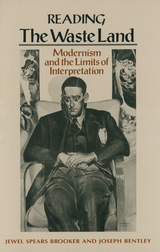

Readings in Interpretation was first published in 1987. Minnesota Archive Editions uses digital technology to make long-unavailable books once again accessible, and are published unaltered from the original University of Minnesota Press editions.
Readings in Interpretation — a volume primarily on the texts of Holderlin, Hegel, and their interpreter Heidegger—locates itself strategically between literature and philosophy. In keeping with this juxtaposition, it treats the question of self-consciousness and reflection on the levels of "theme" and "text." For both Hegel and Holderlin, selfconsciousness and its relation to knowing are explicit themes, but Waminski's readings show that a more disruptive reflection is operative on the level of text.
In an argument that centers on the textual aspects of Hegel's Phenomenology of the Spirit,Warminski demonstrates that the negative moment—which is often interpreted as a prelude to a unified self-consciousness—cannot be accounted for by interpretive models drawn from outside the text—by concepts like the self, consciousness, or the subject. Instead, a completely different practice and theory is necessary. The author's "Prefatory Postscript" at the beginning of the book therefore serves as an introduction to sketch the theoretical basis of the readings that follow and as a "postscript" that explains the difference between "reading" and "interpretation" which those readings make necessary.

Today genre studies are flourishing, and nowhere more vigorously perhaps than in the field of Renaissance literature, given the importance to Renaissance writers of questions of genre. These studies have been nourished, as Barbara Lewalski points out, by the varied insights of contemporary literary theory. More sophisticated conceptions of genre have led to a fuller appreciation of the complex and flexible Renaissance uses of literary forms.
The eighteen essays in this volume are striking in their diversity of stance and approach. Three are addressed to genre theory explicitly, and all reveal a concern with theoretical issues. The contributors are James S. Baumlin, Francis C. Blessington, Morton W. Bloomfield, Barbara J. Bono, Mary Thomas Crane, Heather Dubrow, Alastair Fowler, Marjorie Garber, Claudio Guillén, Ann E. Imbrie, John N. King, John Klause, Harry Levin, Earl Miner, Janel M. Mueller, Annabel Patterson, Robert N. Watson, and Steven N. Zwicker.
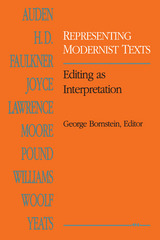
In Representing Modernist Texts, thirteen internationally known scholars provide major explorations of the topic in the work of particular writers. The issues they raise include the construction of a writer’s canon and the effect of newly available “uncanonical” manuscript materials on existing works and orderings; the replacement of the older idea of a fixed, stable text by a more contemporary notion of the text as process; and the interrogation by advanced textual theory of many of the same notions of “author,” “intention,” and “stability of the text” questioned by advanced literary theory.



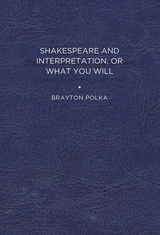
Brayton Polka takes both a textual and theoretical approach to seven plays of Shakespeare: Macbeth, Othello, Twelfth Night, All’s Well That Ends Well, Julius Caesar, Troilus and Cressida, and Hamlet. He calls upon the Bible and the ideas of major European thinkers, above all, Kierkegaard and Spinoza, to argue that the concept of interpretation that underlies both Shakespeare’s plays and our own lives as moderns is the golden rule of the Bible: the command to love your neighbor as yourself. What you will (the alternative title of Twelfth Night ) thus captures the idea that interpretation is the very act by which we constitute our lives. For it is only in willing what others will—in loving relationships—that we enact a concept of interpretation that is adequate to our lives.
Polka argues that it is the aim of Shakespeare, when representing the ancient world in plays like Julius Caesar and Troilus and Cressida, and also in his long narrative poem “The Rape of Lucrece,” to dramatize the fundamental differences between ancient (pagan) values and modern (biblical) values or between what he articulates as contradiction and paradox. The ancients are fatally destroyed by the contradictions of their lives of which they remain ignorant. In contrast, we moderns in the biblical tradition, like those who figure in Shakespeare’s other works, are responsible for addressing and overcoming the contradictions of our lives through living the interpretive paradox of “what you will,” of treating all human beings as our neighbor. Shakespeare’s comedies and tragedies, notwithstanding their dramatically different form, share this interpretive framework of paradox. As the author shows in his book, texts without interpretation are blind and interpretation without texts is empty.
Published by University of Delaware Press. Distributed worldwide by Rutgers University Press.



Text and Culture was first published in 1989. Minnesota Archive Editions uses digital technology to make long-unavailable books once again accessible, and are published unaltered from the original University of Minnesota Press editions.
In Text & Culture, Daniel Cottom examines the political aspects of contemporary disciplines of interpretation. He pleads against limiting the act of reading by disqualifying some readings as "wrong" or unscholarly, and he argues for the necessity of multiple readings, claiming that a closed-off text glosses over differences that are political in nature. He proceeds, then, from the notion of text to culture. Just as the reading of the text is conditioned by irreducible political differences, so is the reading of culture. Finally, to illustrate and further develop his arguments, Cottom presents an extensive analysis of Great Expectations.
Cottom's materials range from academic jokes to King Lear, and the writers he discusses range from Kant to Derrida, from Freud to Basil Bernstein, from Ludwig Wittgenstein and Bronislaw Malinowski to Erving Goffman, Clifford Geertz, and Stanley Fish. This study is especially concerned with the way "culture" and related terms, such as "context" and "norm," are part of a larger discourse in the contemporary humanities and social sciences - a discourse in which their effect is to repress recognition of important historical differences, conflicts, and possibilities. At the same time that he shows how difficult it is to get "beyond culture," he tries to indicate how interpretation may be turned into a more socially responsible practice.
Daniel Cottom is associate professor of English at the University of Florida. He is the author of Social Figures: George Eliot, Social History, and Literary Representation (Minnesota, 1987) and The Civilized Imagination: A Study of Ann Radcliffe, Jane Austen, and Sir Walter Scott.

Text and Interpretation: Imam Jaʿfar al-Ṣādiq and His Legacy in Islamic Law examines the main characteristics of the legal thought of Imam Jaʿfar al-Ṣādiq, a preeminent religious scholar jurist of Medina in the first half of the second century of the Muslim calendar (mid-eighth century CE). Numerous works in different languages have appeared over the past half century to introduce this school of Islamic law and its history, legal theory, and substance in contexts of Shīʿī law.
While previous literature has focused on the current status of the school in its developed and expanded form, this book presents an intellectual history of how the school began. The Jaʿfarī school emerged within the general legal discourse of late-Umayyad and early- Abbasid periods, but was known to differ in certain approaches from the other main legal schools of this time. Namely, the Jaʿfarī school expanded the tools for legal interpretation generally and contracts specifically, to a degree unmatched by any of its counterparts in the Muslim legal tradition. In addition to sketching the origins of the school, the book examines Jaʿfar al-Ṣādiq’s interpretive approach through detailing his position on a number of specific questions, as well as the legal canons, presumptions, and other interpretive tools he adopted.

This major new interpretation makes use of a structuralist analysis of Greek culture to probe the meaning of Sophoclean tragedy. After developing a theoretical framework which encompasses much of early Greek literature and tragedy, Mr. Segal provides a close reading of the seven extant plays, with special attention to style, form, and character. The book yields new understanding of Sophocles' poetic and dramatic art and also achieves a coherent statement of Sophocles' view of the human condition and implicit definition of civilization. Mr. Segal shows in the plays the relation of man to his potential savagery, the suspension of the hero between the extremes of animal violence and quasi-divine greatness, the relation of tragic heroism to social norms, ritual, and communication.
This thorough rereading of Sophocles will well serve students of Greek thought and poetry as well as those interested in seeing literature against a background of myth and ritual.

Scorned by critics since birth, decreed dead by many, naturalism, according to Donald Pizer, is “one of the most persistent and vital strains in American fiction, perhaps the only modern literary form in America that has been both popular and significant.”
To define naturalism and explain its tenacious hold throughout the twentieth century on the American creative imagination, Pizer explores six novels: James T. Farrell’s Studs Lonigan, John Dos Passos’s U.S.A., John Steinbeck’s The Grapes of Wrath, Norman Mailer’s The Naked and the Dead, William Styron’s Lie Down in Darkness, and Saul Bellow’s The Adventures of Augie March.
Pizer’s approach to these novels is empirical; he does not wrench each novel awkwardly until it fits his framework of generalizations and principles; rather, he approaches the novels as fiction and arrives at his definition through his close reading of the works.
Establishing the background of naturalism, Pizer explains that it comes under attack because it is “sordid and sensational in subject matter,” it challenges “man’s faith in his innate moral sense and thus his responsibility for his actions,” and it is so full of “social documentation” that it is often dismissed as little more than a photographic record of a life or an era; thus the “aesthetic validity of the naturalistic novel has often been questioned.”
Pizer posits the 1890s, the 1930s,and the late 1940s as the decades when naturalism flourished in America. He concentrates on literary criticism, not on the philosophy ofnaturalism, to show that literary criticism can make a contribution to a particularly muddled area of literary history—a naturalism that is alive and changing, thus resisting the neat definitions reserved for the dead.

READERS
Browse our collection.
PUBLISHERS
See BiblioVault's publisher services.
STUDENT SERVICES
Files for college accessibility offices.
UChicago Accessibility Resources
home | accessibility | search | about | contact us
BiblioVault ® 2001 - 2025
The University of Chicago Press


